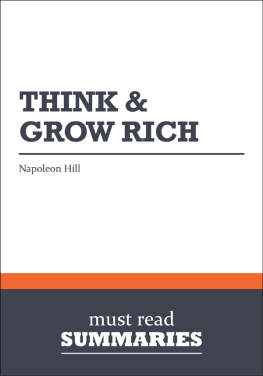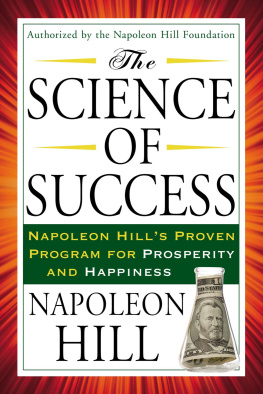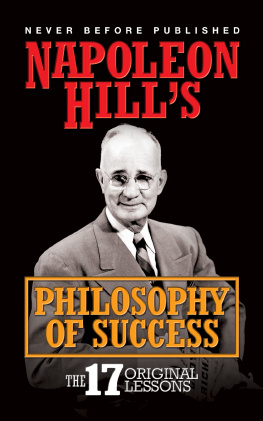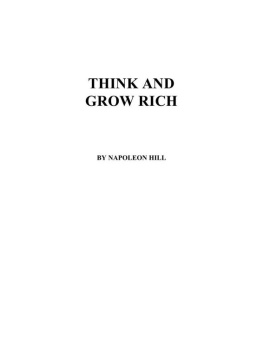
J EREMY P . T ARCHER/ P ENGUIN
An imprint of Penguin Random House LLC
375 Hudson Street
New York, New York 10014

Originally published in 1961 (Brilliance Audio)
Editorial direction: Francine Huss
Copyright 2015 by The Napoleon Hill Foundation
Penguin supports copyright. Copyright fuels creativity, encourages diverse voices, promotes free speech, and creates a vibrant culture. Thank you for buying an authorized edition of this book and for complying with copyright laws by not reproducing, scanning, or distributing any part of it in any form without permission. You are supporting writers and allowing Penguin to continue to publish books for every reader.
Most Tarcher/Penguin books are available at special quantity discounts for bulk purchase for sales promotions, premiums, fund-raising, and educational needs. Special books or book excerpts also can be created to fit specific needs. For details, write: SpecialMarkets@penguinrandomhouse.com
Library of Congress Cataloging-in-Publication Data
Hill, Napoleon, 18831970.
Your right to be rich / Napoleon Hill.
pages cm
Originally published in 1961 (Brilliance Audio).
Includes index.
ISBN 978-0-698-18458-9
1. Success. 2. Success in business. 3. Wealth. I. Title.
HF5386.H5784 2015
332.024'01dc23
2015016532
Cover design by Tom McKeveny
Version_1
CONTENTS
PRINCIPLE #1:
Definiteness of Purpose
PRINCIPLE #2:
Mastermind
PRINCIPLE #3:
Applied Faith
PRINCIPLE #4:
Going the Extra Mile
PRINCIPLE #5:
Pleasing Personality
PRINCIPLE #6:
Personal Initiative
PRINCIPLE #7:
Positive Mental Attitude
PRINCIPLE #8:
Self-Discipline
PRINCIPLE #9:
Enthusiasm
PRINCIPLE #10:
Controlled Attention
PRINCIPLE #11:
Accurate Thinking
PRINCIPLE #12:
Learning from Adversity and Defeat
PRINCIPLE #13:
Cooperation
PRINCIPLE #14:
Creative Vision or Imagination
PRINCIPLE #15:
Sound Health
PRINCIPLE #16:
Budget Time and Money
PRINCIPLE #17:
Law of Cosmic Habit Force
INTRODUCTION to the LECTURE SERIES,
from the Publisher
Y our Right to Be Rich by Napoleon Hill was originally presented as a lecture series to a Chicago audience in spring 1954. Courtesy of The Napoleon Hill Foundation, this publication makes this series of lectures available to you and grows the illustrious works of Napoleon Hill, an American icon of successful living.
Your Right to Be Rich can truly help you achieve your every goal and dream. It will inspire new goals and dreams whereby riches are not restricted to such narrow parameters as fortune and fame. You deserve to be rich in every waypersonally, spiritually, and financially. Dr. Hill discovered that those who attained only financial rewards from life, no matter how great those rewards may have been, were the least happy and satisfied people in the world. To be truly rich, you must be rich in all aspects of life.
While Dr. Hill refers to this philosophy as a science of personal achievementa science of successyou may wonder how success can follow science. Can the steps to riches be synthesized, quantified, and made to work without fail, like a trusted experiment in the laboratory? Dr. Hill defines science as the art of organizing and classifying facts. Like all sciences, the science of success is only useful in its application toward some goal. Dr. Hill presents factual, proven principles so carefully organized and explained that they will, if you follow them carefully and without fail, lead you to the riches you so earnestly desire.
These outstanding lectures represent a unique opportunity to long-devoted students as well as newcomers to Napoleon Hills work. From this material, based on his live lecture recordings, we experience Dr. Hills personal presentation of his outstanding philosophy as never before, in a remarkable, effective, and dramatic manner. This lecture series gives us Napoleon Hills seventeen principles of success, the culmination of decades of study and research.
To more closely achieve the same experience as his students, consider following these three points Dr. Hill strongly emphasized when he gave these lectures:
- Take notes. Keep a notebook handy and take generous notes, starting now. Writing down the information you learn will help to imprint Dr. Hills philosophy more strongly on your conscious and subconscious mind, putting it to work more immediately and effectively. You may choose to write or record your ideas.
- Add your own ideas. As you progress through the material, expand your notes, constantly adding to them your own original thoughts as well as relevant thoughts from newspapers, magazines, radio, and TV.
- Use repetition to make these ideas yours. Dont just read these ideas once. Review this material over and over and over again, emphasizing through the power of repetition their messages of thought and action. The more you work with this course, the more it will work for you.
THE SEVENTEEN PRINCIPLES OF SUCCESS
- Definiteness of Purpose. All achievement starts with setting your major objective and making specific plans for obtaining it.
- Mastermind. This process lets you reap the full benefits of the experience, training, education, and specialized knowledge and influence of others.
- Applied Faith. Turn faith into action so that the power of the soul through which your aims, desires, plans, and purposes are developed may be translated into reality.
- Going the Extra Mile. Rewards multiply when you render more service and better service than you are paid to render.
- Pleasing Personality. Develop the mental, spiritual, and physical traits that will help you make the most of yourself and lead you to success.
- Personal Initiative. Taking action is the principle that is necessary for leadership in any walk of life.
- Positive Mental Attitude. The right attitude creates a path to success and the means by which this philosophy can be implemented.
- Self-Discipline. Emotions must be managed in order to balance your head and your heart to achieve a coordination of reason and emotion.
- Enthusiasm. This dynamo of all individual achievement helps you develop self-confidence and overcome negative thoughts, worries, and fears.
- Controlled Attention. Organize your mind. Focus on success. Coordinate and control the powers of your mind. Use the powerful tool of autosuggestion.
- Accurate Thinking. Gather facts, weigh their relative importance, use your own judgment, and think a matter through in order to make the right decision based on thought vs. opinion or emotion.
- Learning from Adversity and Defeat.


















